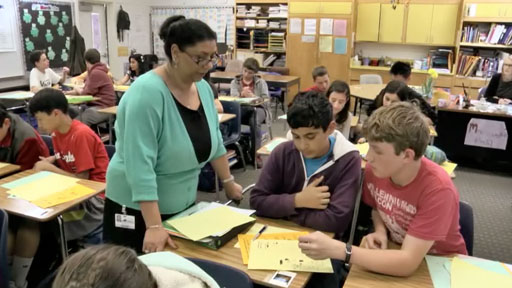
Goals
how the process of lesson observation can be optimized to provide support for principals or others, with or without a professional mathematics background, in identifying the key aspects of a mathematics lesson, and providing feedback that will help teachers support the development of students’ understanding of the mathematics.
Users
Principals, central office curriculum and instruction leaders in mathematics, and other math leaders.
Introduction
Collecting the right information, analyzing it and providing feedback are at the heart of evaluating and improving any system. In schools, classrooms are the systems that, together, determine the building’s and to a great extent the district's overall performance. Thus, principals and other district mathematics leaders need to be deliberate and intentional when collecting, analyzing, and using information from classroom observations. They provide the best source of information about what is going on during lessons, but since a classroom is a complex group of interacting human beings, it is not easy to pick out what is most significant. This is particularly true for observers who do not have a deep background in mathematics. Observers may be impressed by a quiet class listening to a teacher explaining a concept, then working an example on the board, followed by the students working a bunch of very similar tasks. Is this good teaching? It may be excellent class management but with limited learning.
When observing lessons to understand how the learning is going, the key focus needs to be on ‘What are the students doing’? Research shows that few listen to the explanation; they focus on the worked examples, knowing that their role is to imitate what the teacher did. This they mostly do well - though for many their scores in a test later show the learning was transitory. Learning has levels of understanding summarized as: imitation, retention, explanation, adaptation, and extension. Robust long-term understanding depends on them all; the first two are not enough. Classroom observation needs to focus on what the students are doing and how teacher practice affects this. Are students asked to explain their reasoning, not just give answers? Are students given opportunities to apply their mathematics in new ways in order to solve a problem, and to persist if it is not immediately clear what to do? These are key mathematical practices set out in the Standards. Valid classroom observation needs to encompass them. This tool enables observers, with a strong math background or not, to develop those observational skills.The tool supports a 90-minute workshop that, first, offers participants an opportunity to reflect on the various reasons for observing lessons, some issues around lesson observations, and how these issues can be tackled. They then learn and use a research-based framework to support them in the task of observing mathematics lessons, analyzing their qualities, and providing useful feedback to the teacher. The workshop tasks include providing feedback on video clips of lessons, discussing how observers decide where to place their attention when observing lessons, and how what is noted can be organized in a coherent way, that will also help them give feedback that will help teachers improve their practice.
Session Outline
- Observing Classroom Activity
- Introduction to an Observation Framework
- Using the Framework to Look at Two Math Tasks
- Using the Framework to Look at Two Math Lessons
- Comparing the Two Lessons
- The Context of a Lesson Observation
- Where to Go From Here
Videos
The Presentation Slides contain three embedded videos that may not play in older versions of Powerpoint. You can view the video online here:
The Geometry Lesson
This is an extract taken from the TIMMS 1995 video study - see: http://www.timssvideo.com/videos/mathematics/United%20States
The Border Tiles Lesson
From Boaler and Humphreys (2005) Connecting Mathematical Ideas: Middle School Video Cases to Support Teaching and Learning
The Context of a Lesson Observation
Phil Daro, lead author of the Common Core standards for Mathematics